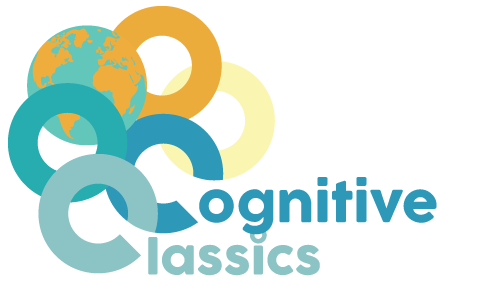
Background and rationale
The idea for this site began when Felix and Katharine began to put together a reading list for a conference on a Cognitive and classical theme; what began life as gathering relevant bibliography in the Classics, soon expanded outwards. Funding from the Fell Fund and St. John’s College (Oxford) allowed Emily Troscianko to be brought in to design and collate the Cognitive Humanities and the Empirical Methods sections. Whilst the discussions were collaborative, these final results represent many hours of Emily’s work, and it is she who should be understood as the author of the annotations.
Our primary aim in the Cognitive Humanities bibliography is to provide a first port of call for scholars in the humanities interested in how the questions they ask about texts might intersect with questions that cognitive scientists address from different angles. (It may also be of interest to cognitive scientists who want to know more about how the humanities are engaging with questions about the mind.) The aim of the Cognitive Classics Bibliography is to provide a sister bibliography to the Humanities-facing bibliography, where all the current research that has been published in this emerging area is available in one place. We launch the site knowing that there are more Classics pieces out there that have not been included, and anticipate those gaps being filled quickly as authors contact us with bibliographic information.
Both bibliographies use the same topic headings to make orientation easier. The majority of the topics covered are core ‘cognitive’ topics: aspects of cognition like memory or attention, on which the primary research has traditionally been carried out by cognitive scientists (amongst whom we include philosophers of mind), and with which humanities approaches have typically only more recently started to engage. We also include a few ‘crossover’ topics, like interpretation and aesthetic experience, where the sciences and the humanities have equally significant – but historically often unconnected – traditions of inquiry. A third, separate, section focuses on empirical methods, and sets out some important empirical paradigms as they have been used in the cognitive sciences and adopted or adapted for humanities research.
Within the Cognitive Humanities bibliography, each topic has a selection of cognitive-scientific publications, followed by a range of cognitive-humanities works on the topic, with short annotations outlining the basic argument proposed in each. The annotations perform a similar function to article abstracts, being primarily descriptive rather than evaluative, but they are typically much shorter and angled towards what we have decided – subjectively – might be of particular relevance.
Some further caveats:
The choice of topics to be covered treads a delicate line between attempting a relatively comprehensive coverage of the main areas of cognition and trying to prioritise those most likely to be of relevance to people who work on literature. We see this as an evolving resource, and would be pleased to gather suggestions for areas of expansion for when the time comes to review.
The choice of articles and chapters includes up-to-date original research and review articles. The number of references ranges from 3 to 7, and we have tended to choose articles and chapters in preference to whole books, so as to be as useful as possible in the time-consuming phase of early exploration. Deciding whether an article on literature counted as ‘cognitive’ or not was difficult in some cases, where for example a squarely cognitive topic was addressed without explicit reference to research from the cognitive sciences, but in a way that did speak to issues at stake in the scientific sources included; our decisions went both ways in cases like this.
Finally, the amount of detail given in the annotations varies too, depending on the complexity of the argument presented in the source and the inferred relevance of its details to literary questions.
It should go without saying that all the decisions made are subject to the idiosyncrasies of our knowledge of the fields in question. We have preferences, biases, and blindspots, and all of these will be manifest in the selections made here. We have attempted to set aside our own opinions enough to include some things we disagree with, and we have certainly reduced our own ignorance significantly just in the process of putting it all together.
The versions on this site are up to date as of early 2017; we envisage updating the Classics bibliography regularly, and the Humanities bibliography periodically. We seek the knowledge and advice of the wider community of scholars in how things might be altered, added to, or improved in future iterations; in the meanwhile, we hope the results are helpful.
Emily, Felix and Katharine
